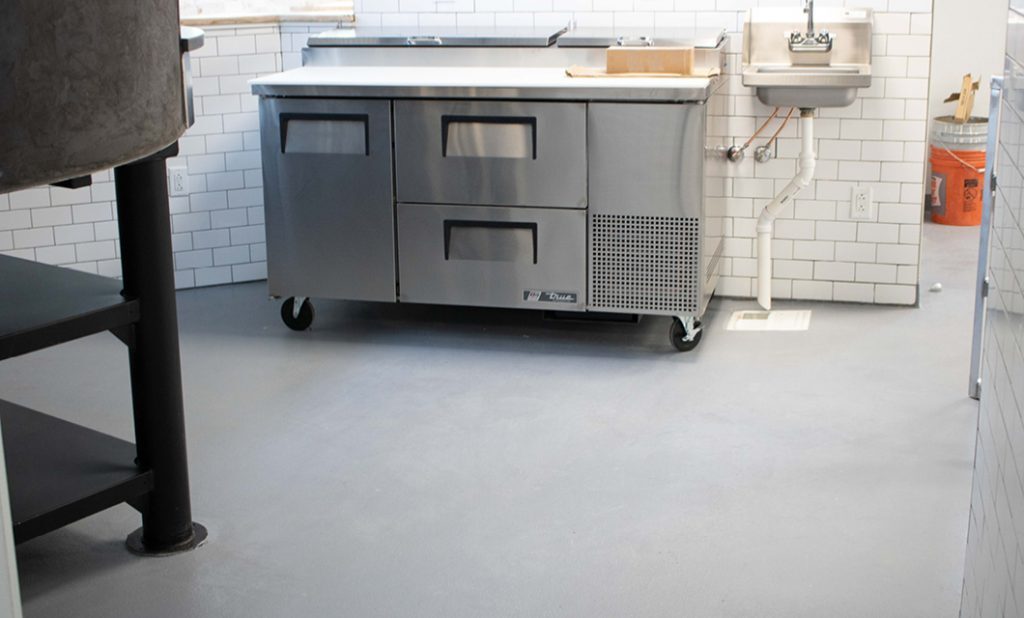
You are looking at flooring for your commercial kitchen with budget in mind, and you have heard about the best option on the market, urethane cement. But you may have a case of sticker shock and are looking for more cost budget friendly options.
It’s understandable, you want the best… the best for you, the best for your budget, the best for your specific situation. At CustomCrete, we are here to help. We have 20 years of experience in concrete coatings. We’ve seen it all. If you’re unsure about urethane cement, there are good alternatives for your commercial kitchen. The answer is Epoxy flooring.

Epoxy flooring is a strong, reliable option for commercial kitchens. It works well for most situations, so long as they aren’t extreme. For kitchens with moderate demands, like delis, ice cream shops, and pizza parlors, epoxy flooring provides a durable and cost-effective solution. It lacks urethane cement’s heat resistance and is not quite as durable. But, it is still tough, easy to maintain, and attractive for kitchens not in constant, super heavy use.
Budget-Friendly Option
One of the most compelling reasons to choose epoxy flooring over urethane cement is its lower cost. Epoxy is significantly less expensive to install, making it an ideal option for kitchens working within a tighter budget. In smaller less foot traffic heavy kitchens, epoxy is cheaper than urethane cement. This can cut your renovation costs and free up your budget for other areas of your business.
Epoxy can’t withstand extreme temperature changes or impacts as well as urethane cement. But, it can handle everyday wear in less-demanding kitchens. Epoxy is a great choice for lighter-use kitchens, like those in delis and pizza parlors. There, budget matters more than needing ultra-heavy-duty flooring.
Quick and Efficient Installation
In addition to being more affordable, epoxy flooring is also faster and easier to install than urethane cement. Epoxy’s installation process is slightly quicker, meaning your kitchen can get back to business faster. This is especially important if you’re operating in a high-turnover environment or need to open a new location on a tight timeline.
Since epoxy can be applied in a thinner layer, there’s less time spent waiting between steps, making it a more efficient solution for busy kitchens.
Durable for Daily Wear and Tear
Epoxy flooring is less heat-resistant than urethane cement. It is also more vulnerable to sudden temperature changes, which can cause delamination. But, it is very durable for everyday kitchen use. Epoxy resists stains, abrasions, and everyday foot traffic, making it a good choice for environments where extreme heat or heavy impacts aren’t a concern. Epoxy holds up well under the normal wear and tear of a kitchen, ensuring it remains in good condition for years to come.
For light duty kitchens like delis or ice cream shops, epoxy is durable enough. Heavy equipment or high temperatures aren’t a primary concern in such places. Its resistance to kitchen hazards like grease and cleaners makes it low-maintenance. Regular mopping and sweeping are usually all it takes to keep the surface looking fresh.
Design Flexibility to Match Your Brand
Epoxy flooring offers a high level of customization, allowing you to match the aesthetic of your kitchen with your brand’s identity. Whether you want a sleek, polished look or prefer vibrant colors and patterns, epoxy can be customized to fit the style you want. The versatility of epoxy means you don’t have to sacrifice design for durability, creating a visually appealing environment that also meets the functional demands of your kitchen.
In fact, epoxy floors come in a wide range of finishes, from glossier options to matte textures. You can even choose anti-slip additives for added safety in areas where spills or water accumulation are more likely. Epoxy can bring your vision to life. It works for a quirky ice cream shop or a professional pizza parlor. Plus, it is a strong, safe flooring solution.
Easy Maintenance and Long-Term Performance
Epoxy’s non-porous surface makes it easy to clean and maintain. Unlike other flooring materials, epoxy doesn’t absorb moisture, making it resistant to mold and mildew growth. The smooth surface of epoxy makes it incredibly easy to wipe up spills and food debris, which is essential in a busy kitchen environment. Since epoxy can handle daily cleaning with minimal effort, it can help reduce the time your staff spends maintaining the floors.
Additionally, epoxy is known for its long-term performance. If installed and maintained well, an epoxy floor can last for years. It will need few repairs or replacements. While it might not be quite as resilient as urethane cement in high-heat environments, it can still provide years of service in kitchens that don’t deal with extreme conditions. This long lifespan makes epoxy a smart investment for kitchens looking to get the most out of their flooring over time.
Slip Resistance for Safety
Safety is always a top priority in commercial kitchens, and epoxy flooring can help mitigate the risk of slips and falls. Many epoxy formulations include anti-slip additives, a type of sand cast into the epoxy to provide texture, that provide excellent traction, even when floors are wet or greasy. This can be particularly important in kitchens that handle fresh food, sauces, or ice cream, where spills are common.
Epoxy’s slip resistance doesn’t just provide peace of mind, it also ensures your kitchen complies with safety regulations and reduces the risk of accidents. By investing in a slip-resistant epoxy floor, you create a safer working environment for your staff and a more secure experience for your customers.
Is Epoxy Flooring the Right Solution for Your Needs?
Epoxy flooring is a fantastic alternative to urethane cement for smaller kitchens like delis, ice cream shops, and pizza parlors. It offers an affordable, durable, and customizable solution that meets the demands of lighter-use kitchens. Epoxy is a smart choice for budget-conscious business owners. It installs quickly, is easy to maintain, and lasts a long time. It meets their needs for both function and beauty.
If you want to know the costs of installing epoxy flooring, or to compare different flooring options, read our article on commercial kitchen floor pricing. Whether you’re ready to install or just gathering information, we’ll help you find the best solution for your kitchen.



